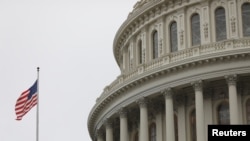ບັນດາສື່ສັງຄົມທີ່ສຳຄັນໆເຊັ່ນ Google, Facebook ແລະ Twitter ກ່າວຕໍ່ ບັນດສະມາຊິກສະພາໃນວັນພະຫັດວານນີ້ວ່າ ການແຊກແຊງຂອງຕ່າງປະເທດ ໂດຍສື່ສັງຄົມຕ່າງໆນັ້ນ ໄດ້ປາກົດໂຕຂຶ້ນມາຢ່າງຫຼວງຫຼາຍ ນັບແຕ່ການເລືອກ ຕັ້ງປະທານາທິບໍດີ ປີ 2016.
ຄະນະກຳມະການຖາວອນ ດ້ານສືບລັບຂອງສະພາຕໍ່າ ໄດ້ຮັບຟັງຄຳໃຫ້ການ ກ່ຽວກັບບັນດາບໍລິສັດເຫລົ່ານີ້ພວມໃຊ້ວິທີການຂອງຕົນແບບໃດເພື່ອຮັບມືກັບ ການໃຫ້ຂ່າວທີ່ບໍ່ຖືກຕ້ອງ ກ່ຽວກັບໂຄວິດ-19 ການປະທ້ວງຊີວິດຄົນດຳເປັນ ເລື້ອງສໍາຄັນ ແລະການເລືອກຕັ້ງປະທານາທິບໍດີ “ທີ່ຈະມີຂຶ້ນໃນປີ 2020 ນີ້ ໄດ້ສະແດງໃຫ້ເຫັນວ່າ ໄດ້ເປີດໂອກາດ ໃຫ້ພວກສວຍໃຊ້ ໃນການໂຄສະນາ ກ່ຽວກັບດ້ານການເມືອງທີ່ແຕກຕ່າງກັນຢູ່ໃນສະຫະລັດ.”
ມາເຖິງມື້ນີ້ ບໍລິສັດທວິດເຕີ (Twitter) ຍັງບໍ່ເຫັນຮ່ອງຮອຍໃດໆໃນການພະ ຍາຍາມຂອງຕ່າງປະເທດ ທີ່ຈະສວຍໂອກາດ ສ້າງຄວາມແຕກແຍກກ່ຽວກັບ ໃນເລື້ອງຜິວພັນ ຫຼືຄວາມແຕກຕ່າງໃນດ້ານແນວຄິດກ່ຽວກັບໄວຣັສໂຄໂຣນາ ນັ້ນຄືຄວາມເຫັນຂອງທ່ານນິກ ພິກເກີລຣ໌ ຫົວໜ້າຫ້ອງການຍຸດທະສາດ ນະ ໂຍບາຍສາທາລະນະທົ່ວໂລກ ແລະການພັດທະນາຂອງ Twitter ໄດ້ກ່າວຕໍ່ ບັນດາສະມາຊິກສະພາ. ທ່ານພິກເກີລຣ໌ກ່າວວ່າ
“ພວກເຮົາຍັງບໍ່ໄດ້ເຫັນຫລັກ ຖານໃນການຈັດແຈງຢູ່ເທິງເວທີ່ຄວບຄຸມໂດຍຜູ້ກໍ່ການຕ່າງປະເທດ ຢູ່ໃນບັນດາ ຂົງເຂດເຫລົ່ານັ້ນເທື່ອ.”
ຫົວໜ້ານະໂຍບາຍຄວາມປອດໄພຂອງເຟສບຸກ (Facebook) ທ່ານນາທານຽວ ກເລີເຈີ ກ່າວວ່າ ບໍລິສັດຂອງທ່ານ ຍັງບໍ່ທັນໄດ້ເຫັນການປະສານງານ ຂອງ ການປະພຶດທີ່ມີຄວາມຈິງໃນພາກສ່ວນບັນດາລັດຖະບານຕ່າງປະເທດ ໂດຍສະ ເພາະແນໃສ່ເປົ້າໝາຍລະບົບການລົງຄະແນນສຽງຫຼືວ່າຈະລົງຄະແນນສຽງຢ່າງ ໃດຢູ່ໃນສະຫະລັດ.”
ແຕ່ວ່າຢູ່ໃນການຖະແຫຼງເປີດ ທ່ານອາດາມ ຊິຟ ທີ່ສັງກັດພັກເດໂມແຄຣັດຈາກ ລັດຄາລິຟໍເນຍ ກ່າວວ່າ ໃນຂະນະທີ່ບັນດາບໍລິສັດສື່ສັງຄົມ ໄດ້ເຮັດຄວາມພະ ຍາຍາມນັບແຕ່ການເລືອກຕັ້ງປີ 2016 ເປັນຕົ້ນມາເພື່ອແກ້ໄຂຄວາມເປັນຫ່່ວງ ກ່ຽວກັບການຄວບຄຸມຕາໜ່າງຕ່າງໆຂອງພວກເຂົາເຈົ້າໂດຍບັນດາອົງການຕ່າງ ປະເທດ “ຂ້າພະເຈົ້າບໍ່ສາມາດເວົ້າໄດ້ວ່າ ຂ້າພະເຈົ້າມີຄວາມເຊື່ອໝັ້ນວ່າ ການ ເລືອກຕັ້ງໃນປີ 2020 ຈະເປັນການເລືອກຕັ້ງທີ່ປອດຈາກການແຊກແຊງ ໂດຍ ພວກກຸ່ມທີ່ບໍ່ດີ ບໍ່ວ່າຕ່າງປະເທດ ຫຼືພາຍໃນປະເທດ ທີ່ຢາກໃຊ້ຕາໜ່າງຂອງ ພວກເຂົາເຈົ້າເປັນອາວຸດ ເພື່ອແບ່ງແຍກຊາວອາເມຣິກັນ ເຮັດໃຫ້ພວກເຮົາບໍ່ ເຫັນພ້ອມນຳກັນ ແລະເຮັດໃຫ້ປະຊາທິປະໄຕອ່ອນແອ.”
ບັນດາຜູ້ຕາງໜ້າຈາກບໍລິສັດ Google, Facebook ແລະ Twitter ໄດ້ກ່າວ ຕໍ່ຄະນະກຳມະການວ່າ ເຂົາເຈົ້າໄດ້ເຫັນການວິວັດທະນາການ ໂດຍບັນດາອົງ ການຕ່າງປະເທດຫຼາຍໆອົງການ ຜູ້ທີ່ກໍາລັງກັບຄືນໄປຫາຫລັກສູດ ທີ່ໄດ້ເຫັນ ເທື່ອສຸດທ້າຍ ຈາກຊຸມປີ 1960 ຫາຊຸມປີ 1980 ເພື່ອປ່ອຍຂ່າວ ທີ່ບໍ່ມີມູນ ຄວາມຈິງ ແລະຫລີກລ່ຽງການຄວບຄຸມບັນດາບໍລິສັດ ໃນການຕອບໂຕ້ຕໍ່ຄວາມເປັນຫ່ວງກ່ຽວກັບການແຊກແຊງຂອງຣັດເຊຍໃນການເລືອກຕັ້ງປີ 2016.
Top social media companies Google, Facebook and Twitter told U.S. lawmakers Thursday that foreign interference on their platforms has evolved significantly since the 2016 presidential election.
The House Permanent Select Committee on Intelligence heard how these companies are adapting their approaches to combating disinformation as COVID-19, Black Lives Matter protests and the upcoming 2020 presidential election present opportunities for the exploitation of partisan political differences in the United States.
To date, Twitter has not seen signs of foreign actors attempting to exploit U.S. racial divides or differences of opinion on the coronavirus, Nick Pickles, Twitter’s director of global public policy strategy and development, told lawmakers.
"We haven't found evidence of concerted platform manipulation by foreign actors in either of those areas,” Pickles said.
Facebook’s head of security policy, Nathaniel Gleicher, said his company has yet to see “coordinated inauthentic behavior on the part of foreign governments, particularly targeting voting systems or how to vote in the United States.”
But in his opening statement, Chairman Adam Schiff, a California Democrat, said that while social media companies have made efforts since the 2016 election to address concerns about manipulation of their platforms by foreign entities, “I can’t say that I am confident that the 2020 election will be free of interference by malicious actors, foreign or domestic, who aspire to weaponize your platforms to divide Americans, pit us against one other, and weaken our democracy.”
Representatives from Google, Facebook and Twitter told the panel they are seeing an evolution by many foreign actors, who are returning to methods last seen from the 1960s through the 1980s to disseminate misinformation and evade controls the companies put into place in response to concerns about Russian interference in the 2016 election. ັັັັັັດດດດດດດ





